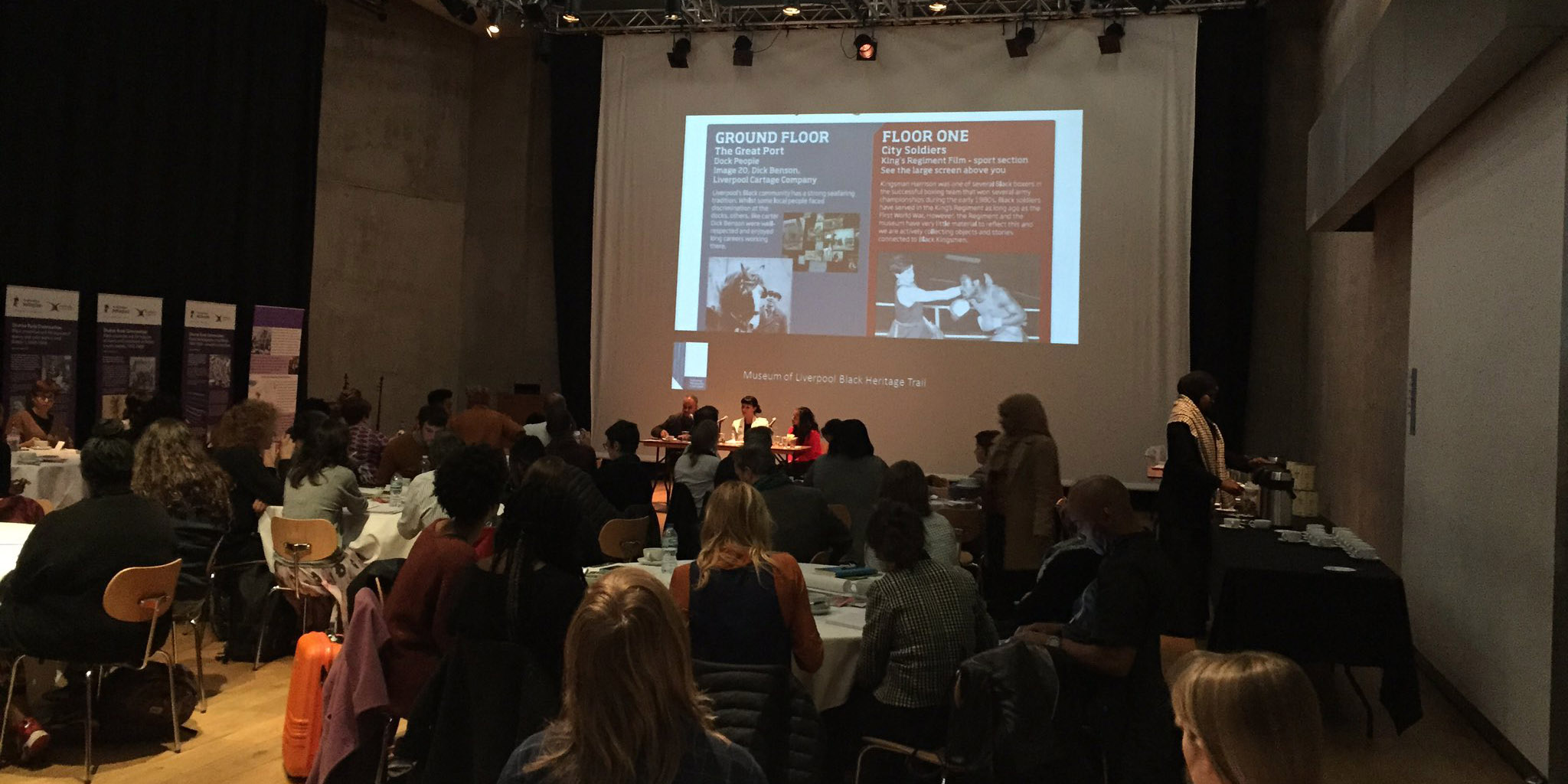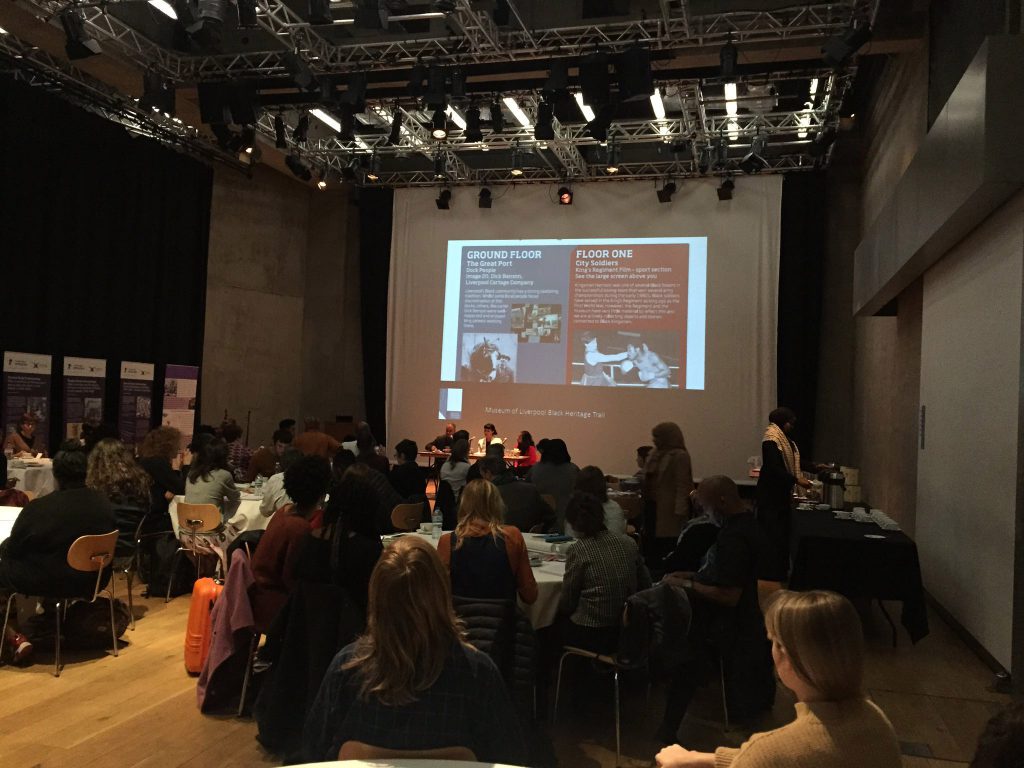
November 7, 2016, by Michael Jennings
Looking back on Centre for Research in Race and Rights events
This year’s Black History Month events, run by the Centre for Research in Race and Rights in collaboration with the American and Canadian Studies Department, were a great success, reaching a variety of communities in Nottingham and provoking important discussions. Below are reviews of the various events held.
October Dialogues: ‘Unspeakable Things Unspoken’: Transatlantic Slavery – A Public Conversation: Day 1 – Wednesday 12 October, by Scott Weightman
On October 12th and 13th The University of Nottingham’s Centre for Research in Race and Rights (C3R) hosted the second annual October Dialogues conference at the Nottingham Contemporary. Following on from last year’s hard-hitting exploration of the Black Lives Matter movement, the October Dialogues’ sophomore year took the transatlantic slave trade as its focus.
Day one, which was supported by the British Academy for the Humanities and Social Sciences, adopted a conference format and included panels covering a wide range of topics relating to the ways in which slavery has figured in public history in Britain. The conference eschewed a conventional academic format and placed far greater emphasis on conversation, with attendees sat on round-tables to stimulate discussion. The vibrant, engaging, and constructive dialogues across the tables were testament to the value of this creative and inclusive approach, which more conferences should adopt in the future. The eclectic mix of attendees and presenters – which included museum and heritage professionals, artists, community historians, activists, academics, poets, performers and educators – made the day and discussions all the more rich.
Highlights of day one included a fascinating look at British pub signs depicting black people, led by Ingrid Pollard, and an inspiring discussion on the importance of community-led initiatives in preserving and transmitting histories of slavery, led by Boseda Olawoye, Lisa Robinson, and Toyin Agbetu, who gave a stirring rendition of an activist chant to kick off their panel. The conference stressed the significant impact that slavery has had on British society in the past and present. It challenged the troubling 2010 declaration that the transatlantic slave trade was no longer a statutory subject in the national curriculum and confronted UKIP’s disturbing assertion that the teaching of slavery in schools undermines Britishness and British values. In the context of the recent rightward turn in British politics, the conference demonstrated the continuing need for the public and academics to engage critically with slavery and its legacies.
An evening of music and poetry, co-curated by Renaissance One, followed and added another level of discourse to the October Dialogues. Local poet, Panya Banjoko, opened the event with her captivating verse – her exploration of Black British experience was deeply affecting. Michael Brome and Marcus Joseph followed with a lively spoken word and saxophone music piece commissioned by literature curator Melanie Abrahams. To close out the evening, Jean ‘Binta’ Breeze engaged in candid conversation with Professor Abigail Ward (University of Nottingham) and gave a wonderful and warm performance of her poetry, which took Caribbean women as its focus and spoke to the interconnected themes of race and gender, and slavery and colonialism.

The October Dialogues
October Dialogues: ‘Unspeakable Things Unspoken’: Transatlantic Slavery – A Public Conversation: Day 2 – Thursday 13 October, by Scott Weightman
The second year of the October Dialogues also saw the addition of a second day, which was sponsored by Journey to Justice, Galleries of Justice, Midlands3Cities, and C3R. Day two brought together local activists from Nottingham and the East Midlands to discuss and develop new and existing projects that chime with the themes covered in day one. The workshop opened with four local organisations briefing the room on their projects, which included an upcoming film about Nottingham as a rebel city produced by Syncopate Media, the Slave Trade Legacies’ pioneering project to confront the role of enslaved people played in contributing to the material wealth in Britain, and Nottingham Contemporary’s Black Arts Movement programme. After the introductions, small focus groups were formed to consider ideas on how to take the respective projects forward. The room was alive with productive, constructive conversation.
I was there representing the fourth local project: Journey to Justice: Nottingham, an exhibition set to open at the Galleries of Justice in February 2017 until June 2017, which looks at the US civil rights movement, its links to the UK, and wider impact, as well as social justice and activism in Nottingham in the past and present, and is set to be accompanied by an event and workshop programme. The conversations I had were enlightening and inspiring and really offered a great deal to the project. In particular, I established ties with the amazing people at the National Caribbean Heritage Museum (formerly SKN Heritage), who will be contributing some of their valuable work to Journey to Justice: Nottingham, and I proposed a collaborative project between Journey to Justice: Nottingham, Nottingham Contemporary, and the New Art Exchange to create a digital and physical archive to document the Black Arts Movement in the East Midlands.
The two days were a wonderful experience and were absolutely packed with excitement. I cannot wait to attend next year’s!
If you would like to find out more about Journey to Justice: Nottingham and if you would like to get involved please contact Scott on sw446@le.ac.uk
“Black Power at 50! Anniversary of Black Power” – Saturday 15 October, by Hannah Jeffery
Hosted on the actual anniversary of the inception of the Black Panther Party, fifty years ago, the Black Power at 50 Film Festival truly celebrated the memory of Black Power. With an introduction from myself on the importance of preserving the memory and legacy of the Movement and its key players – people like Huey P. Newton, Bobby Seale, Stokely Carmichael and Angela Davis – the introduction then shifted focus to the UK Black Power Movement. Omara Dyer-Johnson from the University of Nottingham took to the stage to discuss the even more overlooked UK Black Panther Party before introducing the first film; The Black Power Mixtape, 1967-1975. An enthused audience watched on as the film laced the Black Power Movement with wonderful archival footage of Carmichael, the Panthers and talking head clips from hip-hop artists Erykah Badu, Questlove and Talib Kweli. Revolution ’67 and The Black Panthers: Vanguard of the Revolution were also screened throughout the day to a large audience, and the films were interspersed with small conversations about memorialising Black Power History, making marginalised figures of history more well-known, and discussing the effectiveness of Black History Month. The day was a huge success and highlighted the importance of showcasing frequently vilified/overlooked facets of Black history, as well as opening up a dialogue about how to go about correcting distorted histories.
“The Slave’s Cause” –Wednesday 19 October, by Hannah-Rose Murray
Professor Manisha Sinha’s excellent talk on her latest book, ‘The Slave’s Cause’ was a fantastic event to mark the official annual lecture on behalf of the Department of American and Canadian Studies. Sinha’s new volume argues that abolitionism was a radical social movement that broadened the horizons of democracy. Abolitionism took shape within the context of social revolutions from Europe to Haiti, responding and reacting to protest movements such as Chartism, Irish Repeal and the international peace movement (which in 1849, held a meeting in Paris where formerly enslaved William Wells Brown attended as an American delegate). Sinha also focused on enslaved resistance and how white abolitionists in particular reacted to rebellions and revolts by black people, within plantations and outside them (including on the Creole and Amistad ships). Enslaved people defined abolitionist protest movements as runaway slaves and/or black writers and shaped the very heart of abolitionism in both America and in Britain.
Sinha’s work particularly resonated with me as my PhD focuses on American slavery and abolition, specifically the performances of formerly enslaved African Americans on British soil during the nineteenth century. One of the chapters in her book focuses on these transatlantic visits of black people to Britain, and Sinha argues Britain had a strong impact on American abolitionism as well as providing a crucial network for white and black abolitionists crossing the Atlantic. Sinha’s talk – and workshop with postgraduates earlier in the day – was extremely interesting and provided an insightful glimpse into international abolitionism in the nineteenth century.
“Beyond the Wall: Murals as Activism” – Thursday 20 October, by Timo Schrader
On 20 October, C3R and New Art Exchange partnered up to host an event on murals as a form of activism in the wake of Nottingham’s first Black history mural right outside the New Art Exchange building. First up was a screening of the 2014 documentary Beyond the Walls, which recounts the way murals have been used around the world to bring people together. Through remarkable historical footage and a myriad of critical voices, the film demonstrates the importance of murals for communities around the world including El Salvador, Argentina, Northern Ireland, the West Bank, and the United States. Each mural or mural series is strongly rooted in the lives of people whose village or neighborhood walls become blank canvases for artists and activists. Whether it’s the traumatizing nature of a massacre (West Bank and El Salvador), the struggle of marginalized groups (United States and Australia), or the power of political and social commentary (Argentina and Northern Ireland), all murals partake in the powerful act to bring people together “for something bigger than our individual missions,” as muralist Nina Lasky says. C3R co-director Professor Zoe Trodd and C3R steering committee member Boseda Olawoye reflected on Nottingham’s first Black history mural, which was part of a large AHRC grant on community work. The enthusiasm for the mural has sparked a conversation about future murals in Nottingham and especially the Hyson Green area. The New Art Exchange is currently hosting an exhibition on street art in Egypt as well, which is absolutely worth checking out, including a panel discussion connected to the exhibition on 25 November. For those who think murals are nothing but pretty pictures on ugly walls, this film, the event, and the history and future of muralism are proof that people have always and continue to seek out public art to tell their stories of hope, struggle, and survival.
No comments yet, fill out a comment to be the first

Leave a Reply